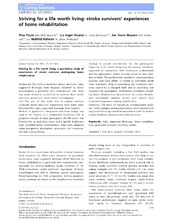| dc.contributor.author | Taule, Tina | en_US |
| dc.contributor.author | Strand, Liv Inger | en_US |
| dc.contributor.author | Skouen, Jan Sture | en_US |
| dc.contributor.author | Råheim, Målfrid | en_US |
| dc.date.accessioned | 2015-12-10T10:58:36Z | |
| dc.date.available | 2015-12-10T10:58:36Z | |
| dc.date.issued | 2015 | |
| dc.identifier.issn | 0283-9318 | |
| dc.identifier.uri | https://hdl.handle.net/1956/10733 | |
| dc.description.abstract | Background: For mild-to-moderate stroke survivors, early supported discharge from hospital, followed by home rehabilitation is preferred over conventional care. How this mode of service contributes to recovery from stroke survivors’ perspective needs further investigation. Aim: The aim of this study was to explore mild-tomoderate stroke survivors’ experiences with home rehabilitation after early supported discharge from hospital. Methods: A qualitative interpretive interview design was used in the context of a randomised controlled trial. A purposive sample of eight participants (45–80 years) was followed by an ambulant team, and a specific healthcare team provided home rehabilitation. Data were analysed using interpretive description, systematic text condensation and coping theory. Findings: A crucial determinant for the participants’ hopes for a life worth living was the mutual confidence expressed in encounters with healthcare professionals and the participants’ ability to make sense of their nowaltered body. The professional caretakers’ communication qualities and their ability to attend to individual needs were important. Help in processing the emotional reactions caused by a changed body and in socialising was requested by participants. Professional caretakers providing home rehabilitation should strive for a more flexibleand individually tailored service and should seek increased cooperation among stakeholders. Conclusion: The focus on therapeutic communicative qualities, bodily changes, emotional processes, social concerns and long-term follow-up should be increased in order to achieve a more beneficial experience for stroke survivors. | en_US |
| dc.language.iso | eng | eng |
| dc.publisher | Wiley | eng |
| dc.relation.ispartof | <a href="http://hdl.handle.net/1956/10736" target="blank">Stroke rehabilitation in the context of early supported discharge. Quantitative and qualitative aspects of daily life after mild-to-moderate stroke</a> | |
| dc.rights | Creative Commons Attribution-NonCommercial-NoDerivs License | eng |
| dc.rights.uri | http://creativecommons.org/licenses/by-nc-nd/4.0/ | eng |
| dc.subject | early supported discharge | eng |
| dc.subject | home rehabilitation | eng |
| dc.subject | Qualitative research | eng |
| dc.subject | recovery | eng |
| dc.subject | Stroke | eng |
| dc.title | Striving for a life worth living: stroke survivors’ experiences of home rehabilitation | en_US |
| dc.type | Peer reviewed | |
| dc.type | Journal article | |
| dc.description.version | publishedVersion | en_US |
| dc.rights.holder | Copyright 2015 The Authors | |
| dc.identifier.doi | https://doi.org/10.1111/scs.12193 | |
| dc.source.journal | Scandinavian Journal of Caring Sciences | |
| dc.source.40 | 29 | |
| dc.source.14 | 4 | |
| dc.source.pagenumber | 651-661 | |

